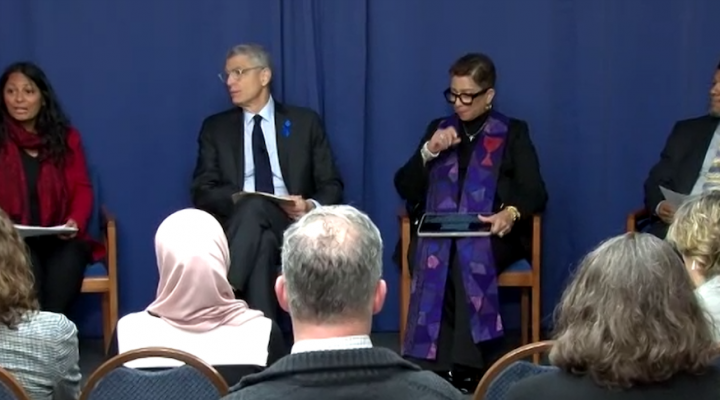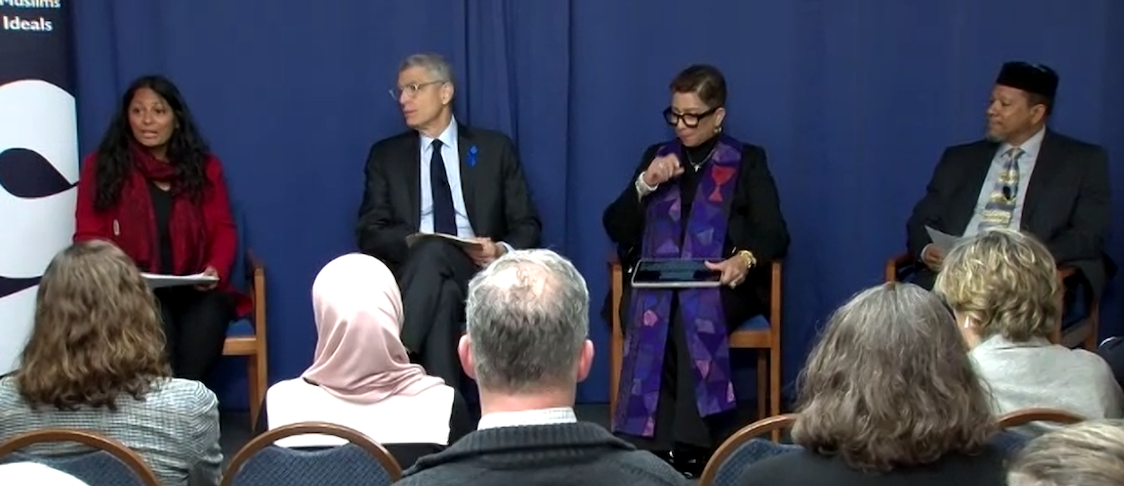Christian nationalism is the root of the racism, antisemitism and Islamophobia gripping the nation, said Teresa Hord Owens, president of the Christian Church (Disciples of Christ).
“I’m very concerned as a Christian leader about its resurgence. It’s the same Christian nationalism that gave rise to the KKK during Reconstruction,” Owens said during a Dec. 19 panel discussion of the ongoing rise in bigotry plaguing Jewish and Muslim communities in the United States.
Livestreamed from the National Press Club in Washington D.C., Owens was joined on the panel by Rabbi Rick Jacobs, president of the Union for Reform Judaism, and Imam Talib Shareef, president of Masjid Muhammad in Washington.
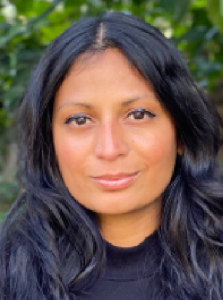
Nina Fernando
Moderating the panel was Nina Fernando, executive director of the Shoulder to Shoulder Campaign, a national multifaith coalition committed to ending Islamophobic hatred and violence in the U.S.
The event was timed as a response to the rise in animosity aimed at Jews and Muslims, especially since the Israel-Hamas war began in October and after nearly 200 bomb threats were made to American synagogues the weekend of Dec. 16-17.
“We believe we can and we must talk to one another beyond our echo chambers and our closed circles if we’re going to make a difference,” Fernando said.
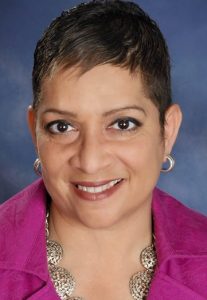
Teresa Hord Owens
But Owens pointed to what she called the true cause underlying the hatred: “What Christian nationalism has done is to insist that there is a black-and-white to all of these issues. It has ‘othered’ everything that is not white and everything that is not a particular form of Christianity.”
She said Christians have a responsibility to actively resist that hostility because the hate-filled movement emanates from their own ranks — as it has throughout American history.
“We’ve really got to be very vocal,” she urged. “Those of us who are Christians must name Christian nationalism as the evil it is. It violates the very law of love. Jesus said, ‘Love one another as I have loved you, and that’s how people will know that you are my disciples.’”
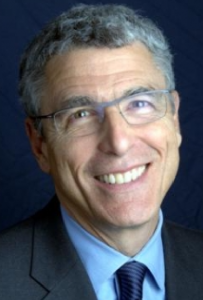
Rick Jacobs
From a Jewish perspective, the pushback against antisemitism, Islamophobia and other forms of bias begins with a reading of the creation account in Genesis, Jacobs said. “The opening chapter says God didn’t create Jews and Muslims and Christians and Buddhists and Hindus. God created human beings in the image of God. Right away it breaks down all those things that make me sit here and be different from others.”
Anti-Jewish and anti-Muslim rhetoric and violence are rising because some consider themselves to be superior to, and threatened by, people of different faiths and ethnicities. The trend was on full display when about 200 bomb threats were recently made against American synagogues in a single weekend.
“Antisemitism isn’t theoretical. It is very real in the United States.”
“Antisemitism isn’t theoretical. It is very real in the United States,” Jacobs said. “When we’re walking down the street wearing a keffiyeh (Muslim headdress) or a kippah (Jewish skullcap), speaking Arabic or Hebrew, those are endangering practices. We are all in that moment of danger.”
But healing responses can emerge from such acts, as happened after the 2017 firebombing of a Texas mosque, the panelists said. The synagogue next door immediately invited the Muslim congregation to worship in its space.
“This moment is hard, and it is deadly and dangerous. It’s all those things at the same time,” Jacobs said. “But there is no way to go forward just by hunkering down and just circling the wagons around each of our communities and hoping that we can sustain ourselves. We can’t. God didn’t put us here to sustain ourselves. We’re here to sustain each other and when it gets harder, it’s even more important. I know that’s what brings us together and that gives me hope.”
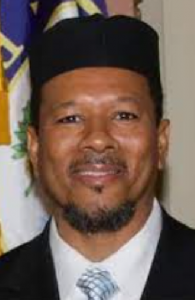
Talib Shareef
Shareef said he finds hope in knowing God creates community through crisis. “Crisis is in our history, scripturally and conceptually. Calamity is initially how things begin.”
But the next phase must be cooperating with others to bring healing, order, justice and unity out of the chaos, he added. “We have an obligation to shoulder the responsibility for the life of the whole — not just for the congregation, but for the whole of society.”
Shareef’s congregation was on the receiving end of such hospitality in 2015 when about 40 neighbors posted “hate free zone” signs throughout the neighborhood when a white supremacist group targeted the mosque for protest.
After the attention generated by the neighbors’ solidarity, the group never showed up, he said. “Love and hate cannot occupy the same space at the same time.”
Owens said she wants to spread the word that love is the answer. “If you start with love, that means you honor the fact that everyone is created by God, that everyone has a right to exist, has a right to be. So, I’m very concerned that other Christians speak out against the dangers of Christian nationalism.”

